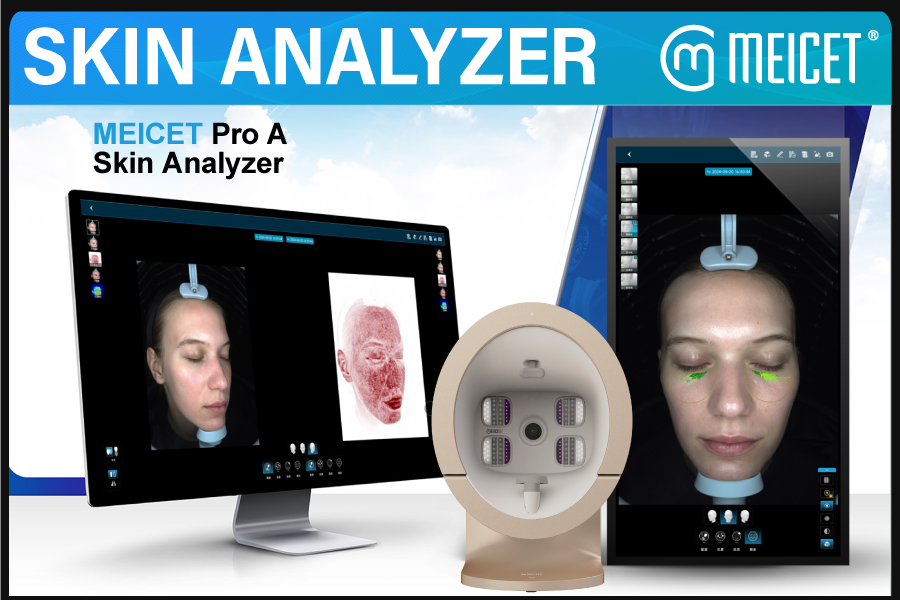The beauty industry in China is undergoing a significant transformation, shifting from a traditional focus on mere aesthetics to a more holistic approach that integrates personal well-being and technological innovation. Central to this change is the rapid adoption of AI-powered devices, particularly AI skin analyzers, which are revolutionizing how consumers approach skincare. These tools are not only enhancing the accuracy of skin assessments but are also aligning with the growing demand for personalized and preventive skincare solutions.
In recent years, the concept of beauty in China has evolved beyond superficial appearances. Consumers are now seeking a sense of “well-being” and “joy” from their beauty routines, moving towards products and services that cater to specific lifestyle scenarios. This trend is driven by deeper emotional needs, such as the desire for confidence, self-expression, and health. The beauty industry has responded by diversifying its offerings, with products becoming highly specialized to meet these nuanced demands. For instance, makeup tools like powder puffs now come in numerous forms, and lip tints are available in a wide range of textures to suit different preferences and situations.
At the heart of this evolution is the AI skin analyzer, a device that has become indispensable in both professional and personal skincare routines. These analyzers leverage advanced imaging technology and multi-spectral analysis to provide a comprehensive evaluation of the skin’s condition. By capturing high-resolution images of the skin’s surface and subsurface, they can accurately identify concerns such as pores, wrinkles, pigmentation, and redness. The MEICET MC10 Skin Analysis System, for example, exemplifies this innovation. It offers detailed reports and tailored treatment recommendations, making it an essential tool for dermatologists and skincare professionals who aim to deliver data-driven and personalized skincare solutions.
The progress in AI skin analysis technology has been remarkable. Modern devices utilize sophisticated algorithms to detect and analyze skin issues with impressive precision. They can assess various factors, including moisture levels, oil distribution, elasticity, and sensitivity, providing a holistic view of skin health. This capability allows for highly customized skincare regimens that address individual needs rather than relying on generic products. The integration of AI also enables these devices to predict potential skin issues, allowing users to take preventive measures before problems become pronounced.
Another key development is the accessibility and user-friendliness of AI skin analyzers. Many devices are now designed for both clinical and at-home use, empowering consumers to take charge of their skincare routines. With features like real-time analysis and easy-to-understand reports, these tools demystify skincare and make it more approachable for everyday users. This accessibility aligns with the broader trend of “fragmented beauty,” where people seek to incorporate skincare into their busy schedules, such as during commute breaks or between work tasks.
The emphasis on personalization is particularly resonant in today’s market. Consumers are increasingly wary of one-size-fits-all solutions and are instead drawn to products and services that acknowledge their unique skin types and concerns. AI skin analyzers meet this demand by offering insights that are both precise and actionable. For instance, they can recommend specific ingredients or treatments based on individual skin profiles, ensuring that users achieve optimal results without unnecessary trial and error.
Moreover, the role of AI skin analyzers extends beyond individual use. They are also becoming valuable tools for beauty brands and professionals seeking to enhance their services. By providing detailed data and analysis, these devices help practitioners build trust with their clients and offer more effective treatments. This technological integration is reshaping the beauty landscape, fostering a culture where science and personal care intersect seamlessly.
In conclusion, the Chinese beauty industry is moving towards a future where technology and individuality reign supreme. The advancements in AI skin analyzers, such as the MEICET MC10, are at the forefront of this shift, enabling a new era of personalized skincare. By combining precise analysis with user-centric design, these devices are not only meeting the current demands of consumers but are also paving the way for a more innovative and inclusive beauty culture. As the industry continues to evolve, the integration of AI and personalized care will undoubtedly remain a key driver of growth and transformation.
by Irina
Post time: Aug-28-2025










